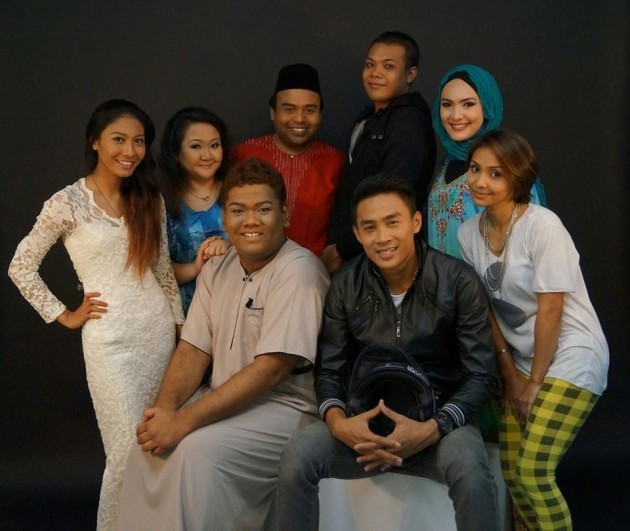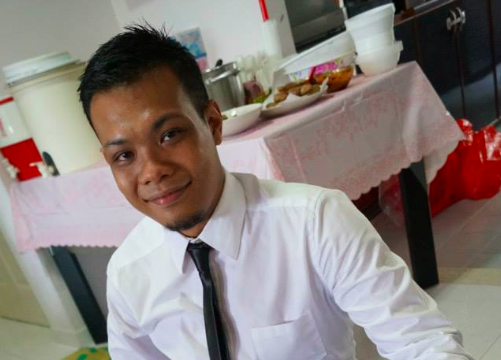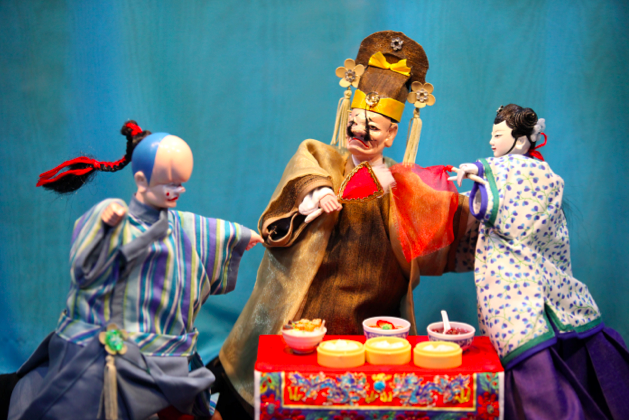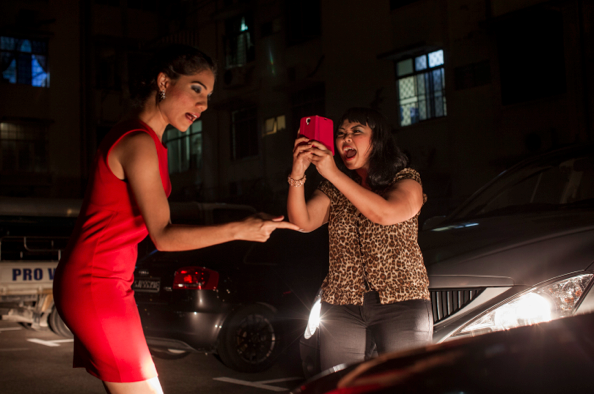Marriage rates are on decline, and divorce rates are on the rise! Bleak.
Yet, for every successful or failed marriage, who’s to take the credit or blame?

LakiBini 2.0, KreatiV OutBox’s latest theatre production (where laki means husband and bini means wife in Malay) explores the tenuous yet comedic relationship between a married couple as well as a divorcee! Punctuated with local anecdotes, anyone would find this play relatable, be it in one’s own relationships or observance of friends and family.
We had the privilege to go behind the scenes with the cast and crew of LakiBini 2.0 to find out more about the transition of Suria’s starlets to theatre, their views on the theatre’s role in Singapore, the importance of multi-ethnic theatre here, and of course, more about the play itself!

Ainon and Den, I understand you’re both currently acting together on Suria. Would this be your first instance with theatre? What made you decide to delve into it?
Den Sabari (DS): My first theatre production was seven years ago – a Malay rock musical in 2007. I recall it being a very tedious process over 4-7 months of rehearsals with character studies, pre-production work, programming and touring two countries! For LakiBini 2.0, I had time to commit so I decided to join in! I love the process of staged plays despite its long process. And LakiBini 2.0’s got interesting characters and a good story line.
Ainon Talib (AT): Yes, LakiBini 2.0’s my first theatre debut. My acting background’s in television, on Suria but I thought this was a good opportunity to delve into theatre. Theatre actors have this X-factor about them! They have an ability to express certain emotions better. I wanted to learn new skills in acting too. Some might say theatre’s easy but it’s really not – you need to emulate emotions accurately and focus intently. I have trouble focusing. In filming for television, I only need to memorise a few lines at one go and deliver them. If I make a mistake, I can do it again but it’s different in front of a live audience for theatre. There’s so much to learn – character studies, voice projection, warming up, maintaining focus, knowing where to walk, how to emote, and internalising emotions. I’ve never had to put in so much effort into acting!
You mentioned about thespians having an X-factor, what exactly would it be?
AT: The internalisation of character and ability to express emotions. Being able to act for television might not mean you can be in theatre. You need to pick up specific skills to be able to move a live audience.
DS: The toughest challenge for thespians is in becoming your character on stage. That’s a skill not every actor can master.
Is the acting and creative process in theatre very different from that of doing so for television?
DS: I’m lucky to have been involved in the pre-production for staged plays and television to experience both worlds. In terms of creativity, I enjoy the process of breaking down a script and at the same time have an overview of the story. I’ll think about what we can do to develop a character or to enhance a play down to the lighting and involve everyone in executing a scene that’s meaningful for both the actors and the audience. The biggest difference between theatre and television would be the proximity to an audience. For television, you can add music and edit a scene. With theatre, your actions have to be exaggerated but not over the top and you need a lot more control over your body language and facial expressions.
AT: On television, you get spoon-fed information about the characters, their background and of what to expect from the very first episode. There’s no such spoon-feeding in theatre. The character build-up is different. I had to sit down and try to understand the character I’m playing – what kind of person she is and why she’s behaving in a certain way. Theatre gives the audience and actors more room for interpretation and imagination.
So perhaps you feel a greater sense of ownership with theatre as compared to acting for television?
AT: Definitely. Apart from Izad moulding me to character, I have to study the character too. If there are certain nuances I think I should express, I will tell Izad and he’ll allow for the characters to evolve organically with feedback.
Now that you’ve had a taste of both, do you have any preference for one?
AT: Well, it depends. For easy money and less work, television will be it. But I do enjoy the sense of ownership I have in theatre as it gives me greater satisfaction.
DS: Theatre, in terms of the satisfaction derived and in involving the whole team. I feel very happy after a performance.

Farez, you’ve been in many theatre shows since your first professional theatre debut with Teater Ekamatra’s Rendezvous Point in 2007. What made you decide to venture into theatre professionally?
Farez Najid (FN): I don’t know when I made the conscious decision! I was quite a difficult child and I was advised to channel my energy elsewhere so I decided to try out drama. And when I didn’t get to perform in the army, that was when I decided I’d take on acting classes and make it a career.
Having worked with a couple of theatre companies in Singapore, what do you think makes one different yet similar from another?
FN: The destination is the same but the process and product is different. The destination being to entertain and inspire, yet we all have different ways of doing and seeing things. With Kreativ Outbox, they’re very family oriented, I’m allowed to question and have an input. If you’re uncomfortable with something, it’ll be taken into consideration. I don’t see acting as just a job but it’s like working with friends. We’re essentially all coming together to do something for the community.
I think theatre, no matter how abstract or different it might seem, is at its heart raw and honest, and oftentimes a reflection of society.
Where do you hope to be in your theatre career in the next 10 years?
FN: I hope to inspire the next generation to express themselves through creativity! I want to work with children as they’re similar to theatre in that they reflect who we are and the ideas we disseminate.
Related: Behind the Scenes: MAN, a play by KreatiV OutBox
Shifting gears to the Director and Assistant Producer of LakiBini 2.0, Izad and Jay, what role do you see theatre play in Singapore?
Jay Jamali (JJ): I think theatre is a good platform for us to show the community the kinds of social issues we face. Like in LakiBini’s case, a Malay couple live out their lives bound by cultural beliefs and religion. It shows that Malay couples come in various shapes and sizes, yet also experience the same problems as everyone else. With theatre, we want to make it simple to understand yet still deliver the key themes being explored.
Izad Omar (IO): I want to provide a sense of escapism with theatre. Singaporeans are too stressed out at work. 9am-5pm, really? I want to make productions easy for people to enjoy after work or on the weekends yet relatable with some lesson to take home and ponder upon.
What’s the message to take back from LakiBini 2.0 then?
IO: To encourage people to realise that maybe they have been interacting with their spouses in a certain way too!
We notice that Singapore’s theatre landscape is a pretty unique one – because of our multi-ethnic society, we’re able to have the privilege of catching theatre in different multi-ethnic languages and at the same time appreciate different cultures through it. Nonetheless, do you think Singaporeans are at the stage where we’re more adventurous and receptive of local theatre?
IO: There’s currently a small audience for local theatre but people are beginning to embrace it. Experimental theatre will be our next step. It’s a healthy progression from what we have now. There’s beauty in the diversity of multi-ethnic theatre, we’re able to explore how different races would react to a similar situation.
JJ: There are different forms of theatre – mainstream, multi-ethnic, experimental theatre. By the time it comes to the next generation, I think they’ll understand it better.
What do you think local theatre groups can do to help elevate or promote the importance of local theatre here?
JJ: I think it’s important to know who our audience is and be honest with what they want, and in time the support will be there.
IO: We are different compared to our contemporaries, we want to portray localised ideas in theatre. Thought the support for local theatre works is not as big, it is there and will continue to grow.
In particular to KreatiV OutBox, how do you make theatre in Malay accessible or relatable to new audiences who might not be familiar with the Malay language or culture?
JJ: I actually didn’t know there was even local theatre in Malay when I first started out in the arts! I think it’s important to make it entertaining, simple to understand, and drive home a key message. The issues we portray in our productions are generic and relatable across races, yet gives an insight into the Malay culture.
IO: Using familiar faces would be one way. It’s also important that you understand your target audience. We want to make LakiBini understandable to non-Malays so we provide English surtitles too. We’re staging a play that transcends language and showcase the Singaporean identity.
In relation to the upcoming production, LakiBini 2.0, what does LakiBini stand for? Why’d you decide to create a second installment since its’ first staging in 2010 and are they different or similar in any way?
IO: Laki stands for husband and bini for wife.
There are endless issues we can explore between laki and bini. Our first one is of a different couple exploring parent-child and in-law relationships. For our second installment, we’ll be tackling the “taboo” topic of divorce. Malays don’t like talking about it but I felt we needed to explore it, on how immature and mature we can be in dealing with it.
You’ll be having two actors from Suria and a seasoned thespian act together in LakiBini 2.0. Is this the first time you’re doing so and why? Has it been a challenge?
IO: I’ve produced but not directed a play with actors, so this will be my first time. They both are good with memorising lines and delivering dialogue. Funny thing is, they act in a television series on Suria as a quarreling couple! So getting them to act like they’re in love in LakiBini can be quite the challenge.
Lastly, a question for all – What do you think is the most important aspect for a lasting marriage?
All: Communication. Patience. Compromise. Trust. Connection. Cash. Understanding. Time management. Passion.

LakiBini 2.0 will be performed in Malay and English with English surtitles. Catch it from 2-4 October, 8pm-930pm – get tickets here!
Image Credit: KreatiV OutBox






